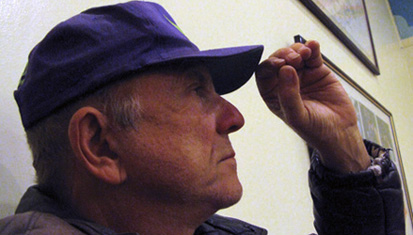| Like the Two de Force website |
|
| Follow Two de Force on Twitter | Follow @two_de_force |
| Visit the Two de Force Fan Page | facebook.com/twodeforce |
two de force  writer/director
writer/director
 |
ORESTES MATACENA was born in Cuba to Italian immigrants and grew up on a sugar mill plantation where the country and all kinds of animals, especially horses, were a large part of his life. |
As a teenager Orestes was part of the resistance fighting to overthrow Fidel Castro, Cuban tyrant and billionaire (according to Fortune Magazine, May 5, 2006). Orestes wanted to help restore freedom and Democracy on the island. Orestes escaped from Cuba on an airplane to Mexico before immigrating legally to the United States and becoming an American Citizen. He lived in Mexico illegally for ninety days and then arrived in the United States, October 30, 1964, without a cent in his pocket and without speaking the English language. Orestes became a short order cook on Coco Beach before moving to Miami. In Miami he worked as a cook, a clothing salesman and a car salesman.
A dreamer and entrepreneur, Orestes decided to start up a playhouse. His first theater was in the living room of his Miami apartment that he shared with his girlfriend Phyllis Baldwin, a North Carolina bombshell. Then, he rented an office space and founded "Theater 66" with Cuban actor/director, Miguel Ponce to produce ten plays together.
Two years later, 1968, Orestes moved to New York. With only a few dollars in his pocket and knowing no one, he had no other choice but to sleep at the Port Authority bus station for a few days. By the fourth month of his arrival, he raised $25,000 and was producing and acting in his first Off-Broadway play called "The Grab Bag." That same year Orestes wrote his first play, "The Gym."
In 1969, Orestes and Miguel founded "The New York Theater of the Americas" where they produced more than thirty original plays. Miguel directed and Orestes acted in many of the productions, playing a variety of roles ranging from a scruffy dog to an Italian Count. Orestes also directed his first play there.
Not only did Orestes work in his own playhouse, but he was hired as an actor in many prestigious New York theater companies such as "Cafe La Mamma," "Stage 73," "Dume," "The Henry Street Playhouse," "INTAR" and "The Astor Place Theater."
In the advertising world, Orestes has worked in over 35 commercials. Nine of these commercials were directed by Marcus Nispel whose body of work is part of the Permanent Collection at The New York Museum of Modern Art.
As a film actor Orestes has played the antagonist in many Hollywood Studio films such as "The Mask" starring Jim Carrey and "Diggstown" with James Woods and Lou Gossett Jr. Orestes Matacena has worked as an actor with high profile directors on films, television and commercials including Charles "Chuck" Russell, Barry Sonnenfeld, Doug Liman, John Milius, Marcus Nispel, Michael Ritchie, John Fortenberry, Leon Ichaso, Kim Manners, Armand Mastroianni, Leslie Dektor, Peter Bloomfield and the great artist Bill Viola.
Orestes is well known for not taking "no" for an answer, which enabled him to raise the capital to produce and direct his first feature movie from a screenplay he wrote called "Tainted." Orestes is, as the French would say, a real film auteur. His body of work to date as a filmmaker includes "In Plain View," "Sex Guns Money @ 20," "Cuba Libre," "Fatal Encounter," "Tainted," "James Gilbert Albright and the Haunted Studio," "The Two Faces of Ruben Rabasa," "Aguabella" (a documentary Produced by Orna Rachovitsky) and "Theater in the Parks." He has written, directed, produced and edited almost all of his work.
Orestes has written three plays, over thirty-five screenplays and various television concepts. His writing encompasses a variety of styles: thrillers, dramas, comedies, horror and action-adventures. "Bitter Sugar," a movie Orestes wrote for Hollywood director Leon Ichaso about a young couple living under the Cuban Communist Tyranny, opened to excellent reviews and was shown to the Human Rights Commission in Geneva, Switzerland and to the United States Congress. For Orestes this was a spiritual and rewarding experience.
In 1975, Orestes founded "The New York Cuban Cultural Center" along with Ruben Rabasa, Ivan Acosta and Clara Hernandez, where they produced twelve plays, recitals, poetry nights, art exhibitions and political debates about the Cuban Communist tyrannical situation oppressing the people living in that beautiful island. Thanks to Ivan, the Center is still part of the New York scene.